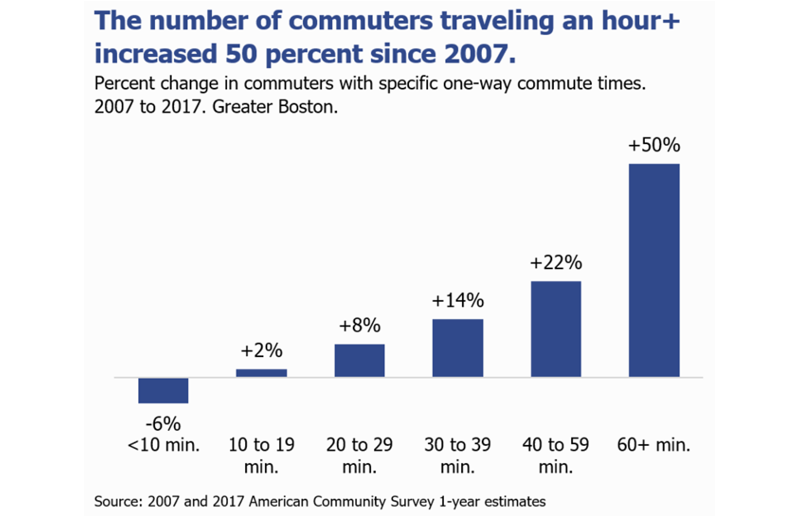Amidst rising commute times for all, a focus on neighborhood equity
By Trevor Mattos
March 28, 2019
Another cluster of neighborhoods with surprisingly long commute times appears just north of Boston in the cities of Chelsea, Everett, and eastern sections of Malden. This area is served by the MBTA’s third busiest bus route – the 111 – which is frequently delayed and overcrowded, and recently caused a public outcry among Chelsea commuters. Though geographically close to downtown Boston (approximately 5 miles), people in these cities often have longer commutes than people living much further away from the city. In Chelsea and Everett, about 20 percent of commuters travel at least one hour to work. By comparison, in several suburbs west of Boston, less than 10 percent of commuters travel an hour or more to work.
Until recently the Fairmount line had expensive, infrequent service and few stops in Boston neighborhoods that had for decades been underserved by public transportation. Responding to local organizing, transportation officials have taken action to help improve transit options in the Fairmount Corridor, building new commuter rail stops (four new stations have opened since 2012, although not all the recent changes are captured in the data analyzed here), running more frequent trains and charging subway-level fares. The MBTA has also responded to concerns in Chelsea by extending Silver Line bus service to the city. Major design, frequency and reliability concerns remain, however. Only time (and forthcoming data) will tell precisely what impact these interventions have had on the lives of these residents who have historically been among the worst-served by our regional transportation system.
This is an online version of our Boston Research Snapshot email newsletter from March, 2019. Sign up to get the newsletter in your inbox every month.
Greater Boston’s transportation system has become increasingly unreliable, just as our economy has taken off and attracted new workers to our region. The quality of MBTA service has declined, and according to one analysis Boston now has the worst traffic in the United States. As housing costs have skyrocketed in the region’s inner core, more people have been forced to live further away from jobs, making them more dependent than ever on having a reliable transportation system. These trends have led to longer commute times for most workers, jeopardizing our region’s long-term competitiveness.
One way to see the magnitude of these changes is by analyzing the most recent U.S. Census data on local commute times. Over the past decade, the average one-way commute to work in Greater Boston increased from 29 minutes to 31.7 minutes (an increase of 9.5 percent). Taking a closer look, we find that since 2007 the number of Boston-area commuters with shorter commutes (<10 minutes) has decreased as the number with the longest commutes (60+ minutes) has risen sharply (see graph below). This change has likely been driven by two phenomena: 1) long-standing commuters experiencing worse transportation system performance, and 2) the addition of new workers to the region who are now more likely to live further from their work.
Not only have commutes gotten longer for most people regardless of transportation mode, some areas of our region have historically been especially poorly served by their transportation options. One important example is the Fairmount Corridor of Boston, which extends along the Fairmount Commuter Rail line, passing southwest through Dorchester, Mattapan, and Hyde Park. These are some of the lowest-income neighborhoods of the city. Despite being located within the heart of Boston, many commuters along the Fairmount Corridor have substantially longer commutes than people elsewhere in the region who may live much further from work. In Mattapan Square, for example, more than 30 percent of commuters travel at least one hour to get to work each day. By contrast, many suburban commuters further from downtown Boston in places like Newton or Needham have shorter commutes than Boston residents in the Corridor (10 to 15 percent of these suburban commuters travel 60+ minutes.

